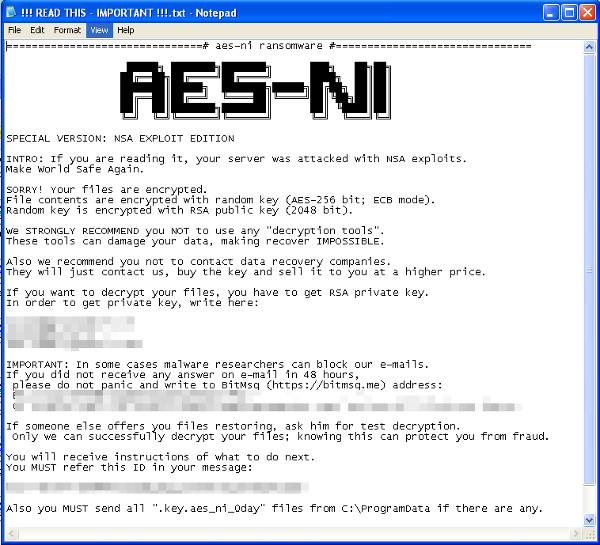RANSOM_SOREBRECT.B
Ransom.AESNI(Malwarebytes)
Windows


Threat Type: Ransomware
Destructiveness: No
Encrypted: Yes
In the wild: Yes
OVERVIEW
This malware is a variant of the SOREBRECT malware that Trend Micro discovered on June 2017. It sports fileless, code-injecting capabilities. Users affected by this malware may find their critical documents and files encrypted and rendered useless.
This Ransomware arrives on a system as a file dropped by other malware or as a file downloaded unknowingly by users when visiting malicious sites.
It connects to certain websites to send and receive information. It deletes itself after execution.
TECHNICAL DETAILS
Arrival Details
This Ransomware arrives on a system as a file dropped by other malware or as a file downloaded unknowingly by users when visiting malicious sites.
Installation
This Ransomware drops the following files:
- {folder of encrypted files}\!!! READ THIS - IMPORTANT !!!.txt - ransom note
It adds the following processes:
- svchost.exe
It injects codes into the following process(es):
- svchost.exe - added process
File Infection
This Ransomware avoids infecting folders containing the following strings:
- Windows
- Desktop
Other Details
This Ransomware connects to the following URL(s) to get the affected system's IP address:
- ipinfo.io
It connects to the following website to send and receive information:
- {BLOCKED}3nsydva3p2.onion/gate.php
It renames encrypted files using the following names:
- {original filename and extension}.aes_ni_0day
It does the following:
- It clears all Windows Event logs using the wevtutil.exe command.
- It terminates services with the following strings:
- Acronis VSS Provider
- AcronisAgent
- AcronisFS
- AcronisPXE
- AcrSch2Svc
- AdobeARMservice
- Altaro.Agent.exe
- Altaro.HyperV.WAN.RemoteService.exe
- Altaro.SubAgent.exe
- Altaro.UI.Service.exe
- AMS
- Apache2.2
- Apache2.4
- ARSM
- BackupExecAgentAccelerator
- BackupExecAgentBrowser
- BackupExecDeviceMediaService
- BackupExecJobEngine
- BackupExecManagementService
- BackupExecRPCService
- BCFMonitorService
- bedbg
- Browser
- cbVSCService11
- CertPropSvc
- CertSvc
- CobianBackup11
- ComarchAutomatSynchronizacji
- ComarchML
- ComarchUpdateAgentService
- CrashPlanService
- dashboardMD Sync
- DataCollectorSvc
- dbupdate
- dbupdatem
- DbxSvc
- DLOAdminSvcu
- DLOMaintenanceSvc
- DomainManagerProviderSvc
- EDBSRVR
- eXchange POP3 6.0
- FBSServer
- FBSWorker
- FirebirdGuardianDefaultInstance
- FirebirdServerDefaultInstance
- GenetecSecurityCenterMobileServer
- GenetecServer
- GenetecWatchdog
- KAORCMP999467066507407
- LMIRfsDriver
- LogisticsServicesHost800
- MELCS
- memcached Server
- MEMTAS
- MEPOCS
- MEPOPS
- MESMTPCS
- MicroMD AutoDeploy
- MicroMD Connection Service
- MICROMD72ONCOEMR
- MMS
- MsDtsServer
- MsDtsServer100
- MSExchangeADTopology
- MSExchangeAntispamUpdate
- MSExchangeEdgeSync
- MSExchangeFBA
- MSExchangeFDS
- MSExchangeImap4
- MSExchangeIS
- MSExchangeMailboxAssistants
- MSExchangeMailSubmission
- MSExchangeMonitoring
- MSExchangePop3
- MSExchangeRep
- MSExchangeRepl
- MSExchangeSA
- MSExchangeSearch
- MSExchangeServiceHost
- MSExchangeTransport
- MSExchangeTransportLogSearch
- msftesql$SBSMONITORING
- msftesql-Exchange
- MSSQL$ACRONIS
- MSSQL$BKUPEXEC
- MSSQL$MICROSOFT##SSEE
- MSSQL$MICROSOFT##WID
- MSSQL$PROBA
- MSSQL$SBSMONITORING
- MSSQL$SHAREPOINT
- MSSQL$SQL2005
- MSSQL$SQLEXPRESS
- MSSQL$VEEAMSQL2008R2
- MSSQLFDLauncher
- MSSQLFDLauncher$PROBA
- MSSQLFDLauncher$SBSMONITORING
- MSSQLFDLauncher$SHAREPOINT
- MSSQLSERVER
- MSSQLServerADHelper
- MSSQLServerADHelper100
- MSSQLServerOLAPService
- MSSQLSERVR
- MySQL
- MySQL56
- NAVSERVER
- ONCOEMR2MICROMD7
- PleskControlPanel
- PleskSQLServer
- plesksrv
- PopPassD
- postgresql-8.4
- postgresql-9.5
- PRIMAVERAWindowsService
- PrimaveraWS800
- PrimaveraWS900
- QBFCService
- QBVSS
- QuickBooksDB23
- QuickBooksDB25
- RBMS_OptimaBI
- RBSS_OptimaBI
- RemoteSystemMonitorService
- ReportServer
- SBOClientAgent
- ServerService
- sesvc
- ShadowProtectSvc
- SPAdminV4
- spiceworks
- SPSearch4
- SPTimerV3
- SPTrace
- SPTraceV4
- SPWriter
- SPWriterV4
- SQLAgent$PROBA
- SQLAgent$SBSMONITORING
- SQLAgent$SHAREPOINT
- SQLAgent$SQLEXPRESS
- SQLAgent$VEEAMSQL2008R2
- SQLBrowser
- SQLSERVERAGENT
- SQLWriter
- stc_raw_agent
- StorageNode
- swprv
- TeamViewer
- TTESCheduleServer800
- vds
- Veeam Backup and Replication Service
- Veeam Backup Catalog Data Service
- VeeamCatalogSvc
- VeeamCloudSvc
- VeeamDeploymentService
- VeeamMountSvc
- VeeamNFSSvc
- VeeamTransportSvc
- vmicvss
- vmms
- VSNAPVSS
- VSS
- W32Time
- W3SVC
- WinVNC4
- wsbexchange
- WSearch
- WseComputerBackupSvc
- WseEmailSvc
- WseHealthSvc
- WseMediaSvc
- WseMgmtSvc
- WseNtfSvc
- WseStorageSvc
- WSS_ComputerBackupProviderSvc
- WSS_ComputerBackupSvc
- zBackupAssistService
- ZWCService
- It uses TOR to secure its connection.
- It gathers the following information and reports it to its servers:
- Computer Name
- Username
- Malware path
- New infection
- Contents of auth.txt and info.txt.
It deletes itself after execution.
NOTES:
The ransom note contains the following:

SOLUTION
Step 1
Search and delete this file
- {folder of encrypted files}\!!! READ THIS - IMPORTANT !!!.txt
Step 2
Before doing any scans, Windows XP, Windows Vista, and Windows 7 users must disable System Restore to allow full scanning of their computers.
Step 3
Note that not all files, folders, and registry keys and entries are installed on your computer during this malware's/spyware's/grayware's execution. This may be due to incomplete installation or other operating system conditions. If you do not find the same files/folders/registry information, please proceed to the next step.
Step 4
Restore encrypted files from backup.
Step 5
Restart in Safe Mode
Step 6
Restart in normal mode and scan your computer with your Trend Micro product for files detected as RANSOM_SOREBRECT.B. If the detected files have already been cleaned, deleted, or quarantined by your Trend Micro product, no further step is required. You may opt to simply delete the quarantined files. Please check this Knowledge Base page for more information.
Did this description help? Tell us how we did.


